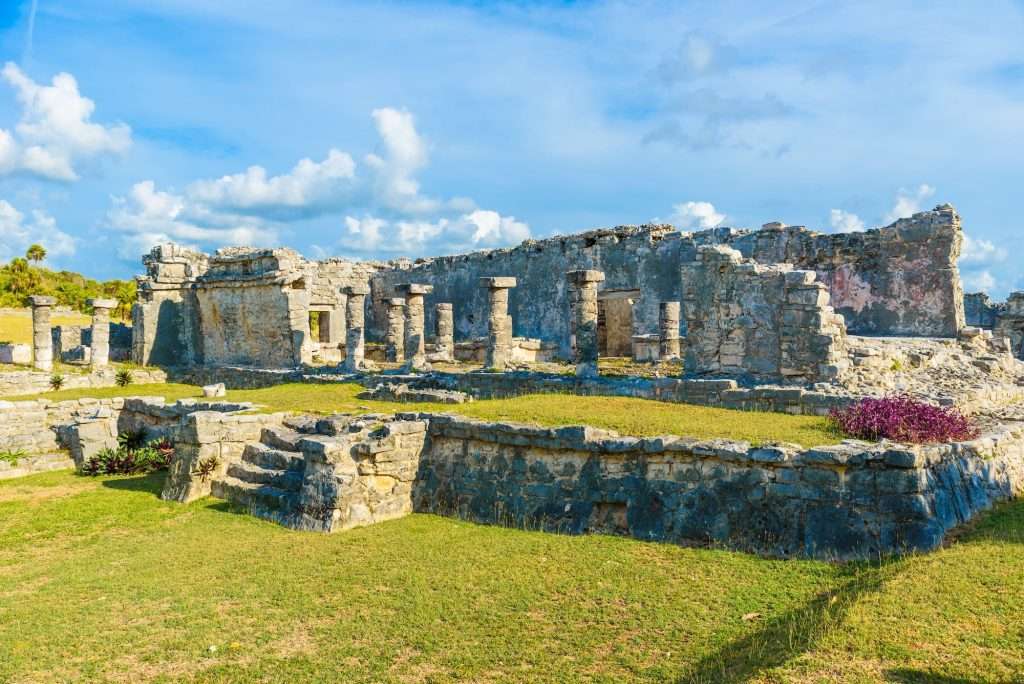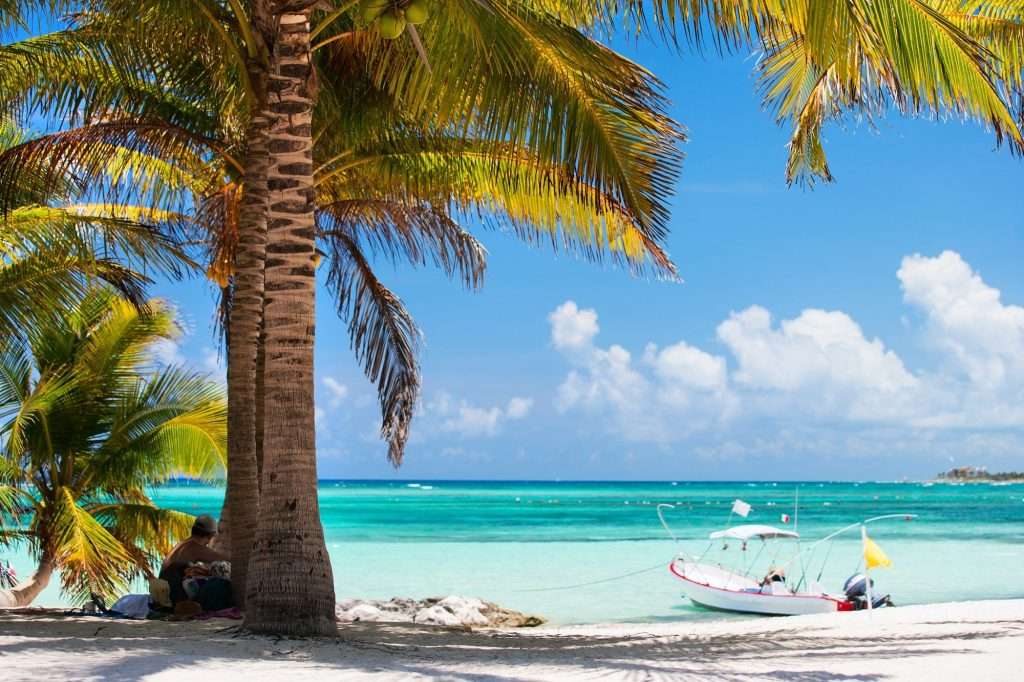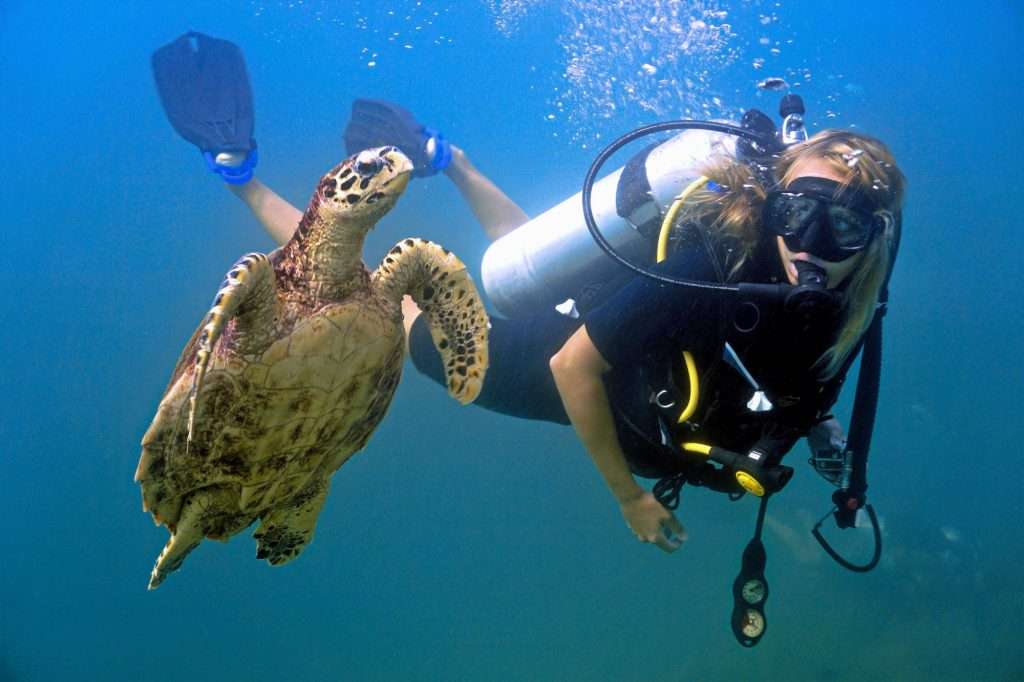Vibrant turquoise water meets powdery white sand, as wild jungle vegetation creates a stunning backdrop. Tulum stands as one of Mexico’s most beautiful coastal destinations, but its popularity comes with a cost. Each year, millions of tourists flock to this paradise, putting pressure on its fragile ecosystems, from coral reefs to ancient cenotes.
Want to experience the magic of Tulum without harming what makes it special? You’re not alone. More and more travelers are looking for ways to enjoy this stunning region while protecting it. The good news? Sustainable travel options in Tulum aren’t just better for the environment – they often create deeper, more authentic experiences you’ll remember long after your tan fades.
This guide will show you exactly how to make responsible choices that enhance your Tulum adventure. From where to stay and what to do, to simple daily habits that make a big difference, you’ll learn practical steps for reducing your environmental footprint while maximizing your enjoyment of this extraordinary place.
By choosing eco-friendly options during your visit, you become part of the solution rather than the problem. Your decisions help preserve the natural beauty and cultural heritage that drew you here in the first place. Ready to plan a Tulum trip that feels good in every way? Let’s get started with how to find truly sustainable places to stay.
Eco-Friendly Accommodations
The foundation of sustainable travel begins with where you stay. Tulum offers a wide range of eco-conscious lodging options that blend comfort with environmental responsibility. From solar-powered beach cabanas to jungle retreats built with sustainable materials, these accommodations show how luxury and sustainability can work together.
Types of green stays in Tulum
When traveling to Tulum, making conscious choices can significantly impact the environment. One important choice is to opt for eco-friendly accommodations: hotels and rentals that prioritize sustainable practices, such as solar energy, water conservation, and waste reduction.
Tulum is known for its eco-friendly accommodations that offer a unique experience for travelers who want to connect with nature while enjoying comfort and luxury. From sustainable treehouses to eco-villas and jungle retreats, there are plenty of options for eco-conscious travelers.
Some of the most popular types include:
- Off-grid beach cabanas: These charming accommodations operate with minimal electricity, often using solar power for essential lighting and fans. Many have open-air designs that eliminate the need for air conditioning.
- Jungle eco-lodges: Set back from the beach, these accommodations are built within the natural landscape, often using local and sustainable building materials with minimal disruption to surrounding trees and wildlife.
- Sustainable boutique hotels: These properties combine eco-friendly practices with upscale amenities, featuring thoughtful design elements like rainwater collection systems and bioclimatic architecture.
What to look for in truly sustainable lodging
When booking your stay, look beyond marketing claims to find truly eco-friendly options. When planning your trip, consider staying at an eco-friendly accommodation such as an eco-lodge or sustainable hotel. These accommodations are designed to minimize their impact on the environment and support local communities.
Key features of legitimate eco-friendly accommodations include:
- Water conservation systems: Properties that collect rainwater, treat and reuse greywater, or have low-flow fixtures help preserve Tulum’s limited freshwater resources.
- Renewable energy use: Look for accommodations powered by solar panels or other renewable energy sources.
- Waste management programs: The best eco-hotels have comprehensive recycling and composting programs, and minimize single-use plastics.
- Local staffing and sourcing: Properties that hire local community members and source food and materials locally have a smaller carbon footprint while supporting the regional economy.
Spotlight on top-rated eco-conscious options
Some of the top eco-friendly accommodations in Tulum include Zamunda Garden View Apartments, Wakax Hacienda, Radhoo Tulum, and VerdeAmar Eco Lodge. These hotels and resorts prioritize sustainability and responsible tourism practices.
Ahau Tulum by Ahau Collection is simply spectacular. The location is amazing within the beach strip and the food/service and rooms are top notch. It’s near everything you want and has a really awesome vibe.
Alaya Tulum is another great hotel with 9 am yoga every morning and walkable to everything. Guests report a really great relaxing stay with lovely beach access and clean rooms. The location is also walkable to all the nearby dinner spots.
Olas Tulum is a peaceful place where one can experience healthy, delicious meals made with locally sourced ingredients. In addition, yoga and soothing massages make this jewel in Tulum a restful retreat.
Responsible Activities and Experiences
Tulum offers numerous ways to experience its natural wonders while maintaining a commitment to environmental protection. The key is choosing activities and tour providers that prioritize conservation and support local communities.
Ocean-based eco-activities
The Caribbean coast surrounding Tulum is home to diverse marine life, including endangered species such as sea turtles and various fish populations. Conservation efforts are vital to ensure the health and sustainability of these ecosystems. Understanding the importance of ocean conservation leads to responsible behavior while participating in water sports and marine tours.
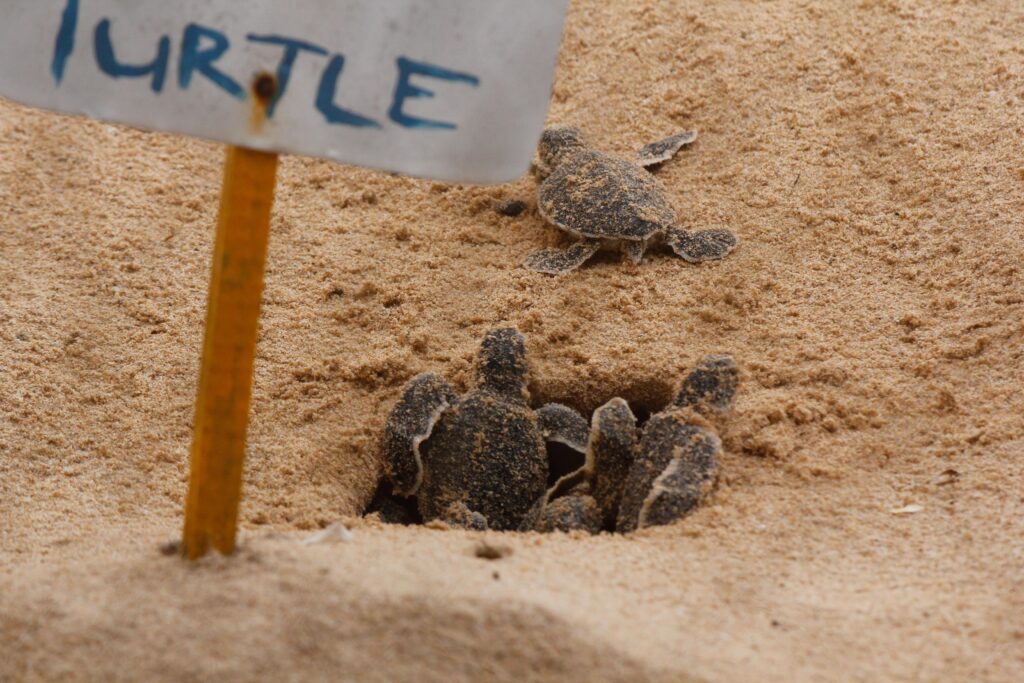
Tulum is home to several species of sea turtles, including loggerhead, hawksbill, and green turtles. Many tour operators offer guided tours of the turtle nesting sites, allowing visitors to learn about turtle conservation efforts and witness the hatching of baby turtles.
Snorkeling trips in Tulum must be organized with care to minimize impact on marine environments. Choose operators that adhere to guidelines promoting responsible snorkeling practices, ensuring the preservation of coral reefs and wildlife.
When selecting ocean activities, prioritize:
- Ethical snorkeling tours: Choose operators that limit group size and provide education about not touching coral or disturbing marine life.
- Sea turtle conservation programs: Several organizations in Tulum offer opportunities to learn about and participate in turtle protection efforts, especially during nesting season (May to October).
- Responsible boat tours: Look for operators using eco-friendly motors and following guidelines to minimize their impact on marine ecosystems.
Land-based nature experiences
Sian Ka’an Biosphere Reserve, a UNESCO World Heritage Site, is an incredible destination for eco-friendly tours in Tulum. Covering over 1.3 million acres, this biodiverse reserve includes tropical forests, marshes, and coral reefs. Guided tours allow visitors to immerse themselves in the area’s natural beauty while ensuring that their activities leave a minimal environmental footprint.
Sian Ka’an Biosphere Reserve is home to an incredible variety of wildlife, including jaguars, manatees, and crocodiles. Visitors can explore the reserve on foot, by boat, or by kayak, depending on their preferences. Be sure to choose a tour operator that is committed to sustainable tourism practices and supports the local community.
Tulum is famous for its cenotes – natural sinkholes filled with crystal-clear water. Many eco-friendly tours combine snorkeling and swimming in these stunning cenotes, allowing you to experience the unique aquatic ecosystems. Responsible cenote tours prioritize conservation, limiting the number of visitors to protect these fragile environments.
Biking is a great way to explore the natural beauty of Tulum while minimizing your carbon footprint. There are several bike tour operators in Tulum that offer guided tours of the area’s beautiful beaches, jungles, and cenotes.
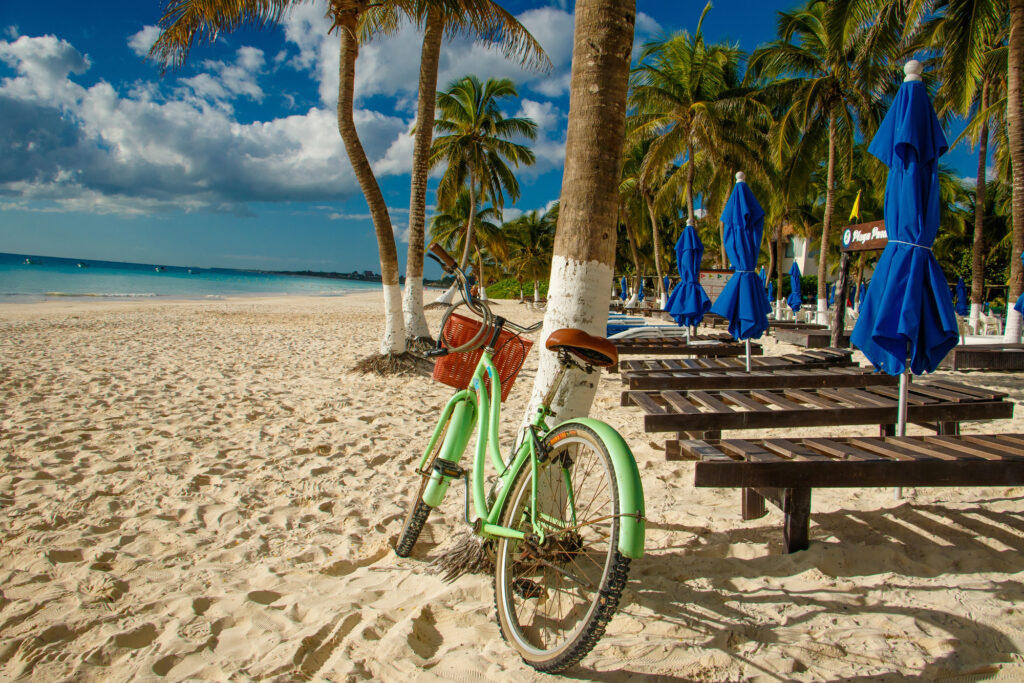
Some of the best land-based eco-activities include:
- Guided nature walks: Participating in guided nature walks is an excellent way to connect with Tulum’s abundant wildlife. Knowledgeable guides can help you identify local flora and fauna while educating you about the habitats’ history and ecological significance.
- Cenote exploration: Visit these ancient natural sinkholes with guides who explain their cultural significance and ecological importance. Look for tours that enforce proper washing before entering (to remove sunscreen and other contaminants) and limit visitor numbers.
- Bird watching tours: Tulum is home to many bird species, making it a prime spot for bird watchers. Engaging in responsible wildlife viewing adventures helps raise awareness about conservation efforts and promotes sustainable tourism practices. Tulum is a haven for bird watchers, with over 300 species of birds in the area. Visitors can take guided bird watching tours to spot rare and exotic birds in their natural habitats.
Cultural eco-tourism
The Mayan Inland Expedition is a highly praised tour that takes guests through the stunning landscapes of Tulum. This eco-friendly tour typically accommodates small groups, offering a more individualized and meaningful experience. Travelers explore ancient Mayan ruins, cycle through dense jungles, and learn about the local culture and history while providing financial support to the surrounding communities.
Eco-tourism isn’t just about natural environments – it also includes sustainable interactions with local cultures and communities:
- Indigenous Maya experiences: Learn about traditional farming techniques, medicinal plants, and cultural practices from Maya community members who benefit directly from tourism dollars.
- Artisan workshops: Visit studios where local craftspeople create using sustainable materials and traditional techniques. Purchasing directly from artisans helps support the local economy.
- Farm-to-table culinary experiences: Tulum boasts an array of restaurants focusing on locally sourced, organic ingredients. Dining at these establishments not only nourishes you but also supports local farmers and producers. Hartwood restaurant is committed to sustainability, using local and seasonal ingredients and cooking on an open flame grill. Hartwood also uses composting toilets and recycles waste to minimize their environmental impact.
Practical Tips for Minimizing Your Travel Footprint
Beyond where you stay and what you do, your daily choices while in Tulum can significantly impact your environmental footprint. Small decisions add up to make a big difference in preserving this beautiful destination.
Transportation choices
Choose sustainable transportation options: Walking, biking, or using public transport can reduce your carbon footprint during your stay in Tulum.
The way you get around Tulum can be one of the biggest factors in your overall environmental impact:
- Rent bicycles: Tulum is relatively flat and compact, making bicycles an ideal way to travel between the beach zone, town, and nearby attractions.
- Use shared shuttles: When traveling longer distances, choose shared transportation rather than private taxis to reduce per-person emissions.
- Consider electric vehicles: Some rental companies now offer electric scooters or cars, which produce fewer emissions than traditional vehicles.
- Walk when possible: The beach road is perfect for walking, with many accommodations, restaurants, and shops within reasonable distances of each other.
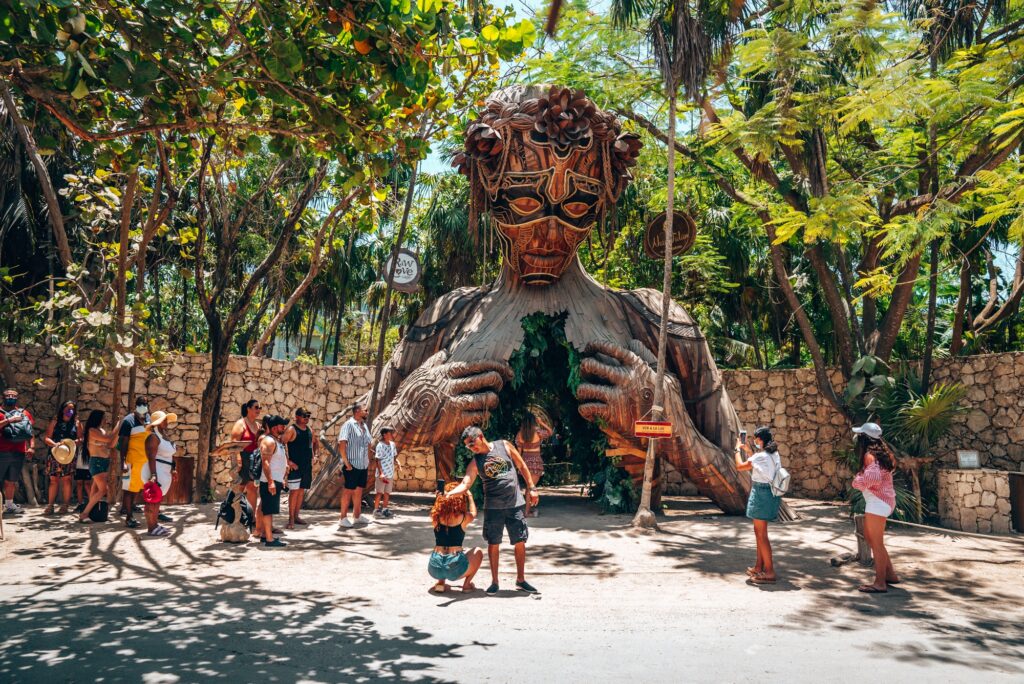
Daily habits that make a difference
Limit water usage: Be mindful of your water consumption while on the road by taking shorter showers and reusing towels at your accommodation. Always bring reusable items: Help reduce plastic waste by using reusable water bottles, shopping bags, and utensils.
Simple daily practices can help minimize your impact:
- Water conservation: Tulum faces significant freshwater challenges. Take short showers, turn off taps when not in use, and reuse towels rather than requesting daily washing.
- Reduce plastic waste: Bring a reusable water bottle, shopping bag, and utensils. Decline straws and other single-use items when offered.
- Use reef-safe sunscreen: Traditional sunscreens contain chemicals harmful to coral reefs. Choose mineral-based products (zinc oxide or titanium dioxide) labeled as “reef-safe.”
- Conserve energy: Turn off lights, fans, and AC when not in your room. Many eco-lodgings have limited electricity hours – embrace this as part of the experience.
Supporting the right businesses
Choose small group tours: Preferably book eco-tours that limit the number of participants to promote a more personal and less impactful experience. Tulum is home to many small, locally-owned businesses that offer unique and authentic experiences. Support these businesses by eating at local restaurants, shopping at local markets, and booking tours with local operators.
Your spending choices directly impact which businesses thrive in Tulum:
- Research before booking: You can support sustainable tourism in Tulum by choosing eco-friendly accommodations, supporting local businesses and artisans, respecting local culture and customs, and practicing responsible tourism behaviors like reducing waste and conserving resources.
- Ask questions: Don’t be afraid to ask tour operators about their sustainability practices. How do they minimize their environmental impact? Do they support local conservation efforts? Do they employ local staff and pay fair wages?
- Recognize greenwashing: Some businesses make environmental claims without meaningful practices to back them up. Look for specific, concrete actions rather than vague promises about being “eco-friendly.”
- Eat local and seasonal: Choose restaurants that source ingredients locally and adapt their menus based on seasonal availability. Raw Love is a plant-based restaurant that offers healthy and delicious food that is sourced locally and organically. They’re committed to sustainability, using compostable plates and cutlery and recycling waste.
Your Turn to Make Waves of Positive Change
Tulum’s breathtaking beauty exists in a delicate balance. From the stunning azure waters to the lush jungle landscapes, this paradise thrives when visitors make conscious choices. As we’ve explored, eco-tourism in Tulum isn’t about sacrifice – it’s about deeper, more meaningful experiences that create positive ripples throughout the local environment and communities.
By choosing eco-friendly accommodations like those we’ve highlighted, participating in responsible activities, and adopting simple daily habits that reduce your impact, you become part of the solution rather than contributing to the challenges facing this remarkable destination. Each choice – from the tour operator you select to the sunscreen you apply – shapes the future of Tulum.
Ready to experience Tulum the right way? Santamar by Tao in nearby Akumal offers the perfect base for your eco-adventures, combining sustainable luxury with convenient access to all the natural wonders we’ve discussed. Browse available dates, check out the thoughtfully designed spaces, and take the first step toward a vacation that feels good in every way – for you, the local community, and the precious ecosystems you’ll explore.
Book your sustainable stay today and discover how responsible travel creates not just memories, but meaningful change. Your Tulum adventure awaits!



